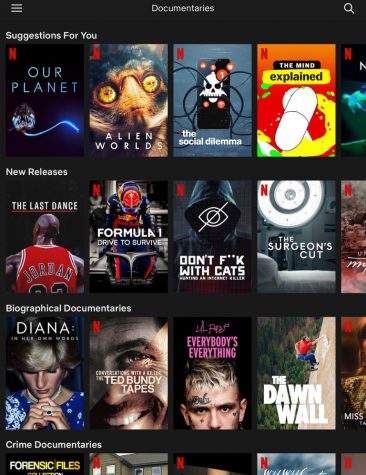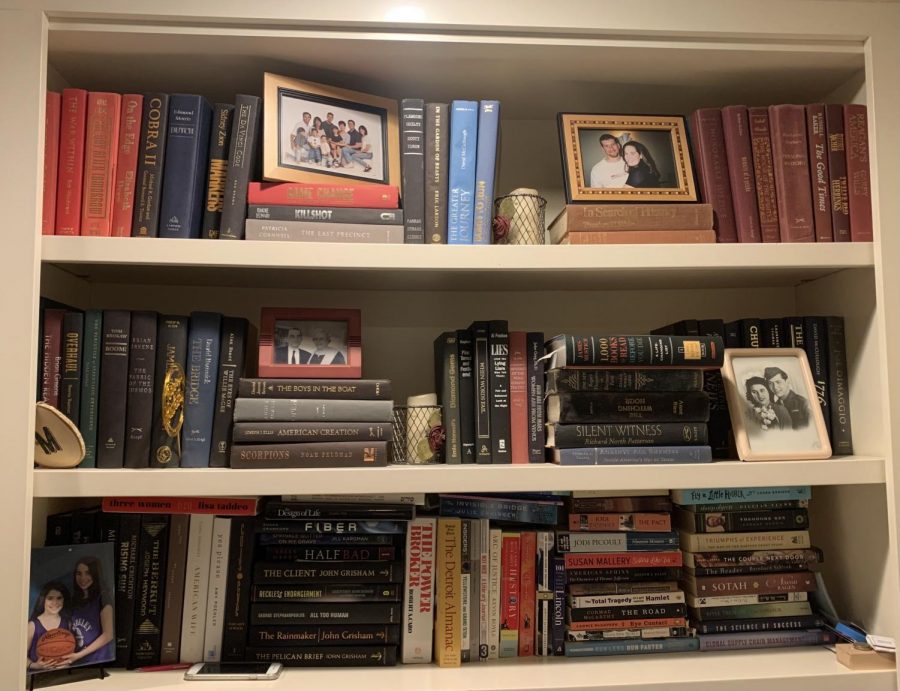The Power of a Page
“You don’t have to burn books to destroy a culture. Just get people to stop reading them.” – Ray Bradbury
Books. That is all I see when entering my living room. Shelves jammed with novels that are wider than my forearm. Spanning from “The Bridge” by David Remmick to “Silent Witness” by Richard North Pattern, these endless publications indicate a personal issue of oblivion; I know little in a bountiful world. Never have I heard of Jill Kargman or Lisa Taddeo, but observing the seemingly infinite number of pages they have been able to produce, composed of personal passions and intrigues, I worry that I am falling behind in some way, that I am missing out on a world that generations before me have taken part in with ease, and interest. I watch as my father walks laps around Huntington Woods, cycling through thousand paged novels, quickly retaining new perspectives and information. I assume my grandparents were the ones that placed these writings on our shelves, as they date back decades before they were born, and with that, they lived with the same highbrowed proactivity.
It’s not that I am not curious. I am. Every day, I expose myself to more, observe more, ask more questions, and the world consequently becomes more dynamic. However, it is not through the books that my parents and grandparents spent hours sifting through that I get my information, it is through a new medium, a virtual one.
Just 15 feet away from these shelves is our television. One that possesses apps like Netflix and Hulu, with their own shelves. Shelves that hold hundreds of documentaries about an abundance of topics. These virtual ledges are where I constantly find myself perusing after school, stimulating new interests. I go from one documentary to another, being shown new aspects of this world that my mind was previously unacquainted with. Whether it is learning about psychedelics (don’t worry mom), environmental science, photography, or the greater effects of technology, my screens are at the forefront of my education for many hours during the week. It does not just end there. Filtering amongst alluring youtube videos or scrolling through TikTok, I find that most of the information that I am engaging with, the topics that I have discourse with family and friends over, is displayed on my screens. Rather than occupying to the Huntington Woods library and looking exhaustively through books, I simply type into my computer “what does rehabilitation in prison entail” and infinite sources pop up instantly.
I am not an anomaly in our generation. This shift towards screens and away from pages has been evident for decades now. According to the American Time Use Survey from the Bureau of Labor Statistics, the number of Americans that read during leisure time has decreased by 30 percent. This is not just stemming from my generation alone, as the total reading time of Americans has dropped the most in the 35 to 44 age range. Additionally, the number of people who read for pleasure, high schoolers and up, has sunk by nine percent since 2004. In a report conducted by “Numbers from the National Endowment of the Arts”, the number of adults reading at least one novel, poem, short story, or play per year has fallen 14 percent since 1982. The trend could not be clearer and, truthfully, it is not surprising. With open-ended headlines consistently stemming from major news outlets, people are bred for quick answers. Unlike the days of Marshall McLuhan, humans are not as willing to take the time to dive into deeper meanings and messages. We prefer to be spoon-fed information, despite its long term effects.

Ironically, I write this article mainly because I have observed a recent uproar in enthusiasm for reading from one of my classes. In Project Advance, at the beginning of each Zoom, people share the good news that has occurred in their own lives. As of late, a common comment from students has been that they started reading a book. At first, I did not think much of it… good for them. But as the weeks went on, seemingly more and more students spoke about the books they have been reading. This, combined with the constant nagging from my dad — “You really should start reading more books.” — truly caught my attention. Why have I not been reading outside of school? Are the substitutes just as impactful as reading itself? And what are the advantages of reading? Those questions stood with me, as I started to search for answers, which weren’t difficult to find.
The benefits of reading, an activity that is hastily on the decline, are quite substantial:
To start, using MRI scans, neuroscientists have confirmed that the more one reads the stronger their brain connectivity becomes. Since the act of reading includes a complex network of signals and circuits, while one reads they are bolstering those brain connections. In a study done by PubMed Central, as someone continued to read over a nine-day period, their brain activity lit up immensely. In turn, this does not occur when we are scrolling through apps on our phones. Brain connectivity is essential for the maintenance of life. It accounts for the different patterns of links in the brain, therefore, since reading strengthens this, you are subsequently becoming smarter.
One aspect that enhances brain connectivity is vocabulary. Throughout reading, one is inevitably exposed to new words that we do not hear on an everyday basis. Improving one’s vocabulary, which is most effective through reading, is important for a variety of reasons. Being acquainted with a large set of words allows people to input and process information quicker. Instead of focusing on attempting to comprehend information, one can spend more time interpreting. Additionally, larger vocabularies lend us the ability to break away from generic thinking patterns and form creative products through abstract thinking. Every new word that we can identify with is a new pathway and a new way of thinking. Hence, in an experiment examined by “Gray Matter”, no matter what profession someone was in, good vocabularies were the most accurate predictor for career success.
Subsequently, since reading improves our vocabulary it also embellishes our memory. In a study conducted by NorthCentral University, participating in brain-stimulating activities, such as reading, produce slower rates of decline in memory and other mental capacities. Essentially, reading provides a certain degree of desirable difficulty. This difficulty strengthens your mind similar to how the difficulty of lifting weights strengthens your muscles. While reading, we are forced to remember characters, ideas, relationships, and more, which help boost brain structure and overall memory. Just like how writing down notes has been proven to stick with us better than typing them out, reading ingrains information in our mind, something that is simply nonexistent when relaxed on the couch watching YouTube.
Concentration also takes a back seat when we are watching television or on apps — they are passive activities. But when we are reading, we are highly engaged with the information, requiring us to concentrate on the words on the paper. Repeated reading helps us focus on one thing over a long period of time. Similar to muscle memory in sports, the more one gets used to concentrating on a book, the easier it gets over time — not just for reading.
The advantageous aspects of reading do not come close to ending there. Benefits including reduction of stress, improved writing skills, enhanced imagination, and better sleeping performance have all been found to be an effect of reading. However, to me, the most impactful ramification of reading is the newfound appreciation for new life perspectives. In a way, reading is the equivalent of going on a vacation and visiting new places, but you are at home, or wherever you prefer to read. The importance of exposing ourselves to different features of this world, making us leave our own bubble, cannot be understated. Ergo, people that read frequently are found to express more empathy towards others because they have a more well-rounded idea of others’ feelings, emotions, and experiences that they have gone through. They are less likely to make snap judgments, as they are often retold the value of not judging a book by its cover. This asset combined with all of the other skills reading provides that are influential in the real world makes it a worthwhile activity.
This does not mean that watching T.V. is bad for you. I am never going to stop watching The Office or Superbad. Nevertheless, recognizing that reading is something that we must start to focus on, mainly because of all the beneficial long-term effects it can have, is truly necessary. So, next time you are scrolling through your social media feed, bored on TikTok or twiddling your thumbs, look for a book or find some source of reading, because it is an important addition to everyone’s life.
Currently reading The Silent Patient by Alex Michaelides

Hi everybody, my name is Matthew Doctoroff and this is my fourth year on the journalism staff. Year after year, the community that is created through the...













Raynah Jacobs • Jan 12, 2021 at 8:44 pm
Truly a great article Matt!
Ezekiel • Dec 17, 2020 at 10:50 am
Truly profound writing, wise beyond your year’s, Doc.